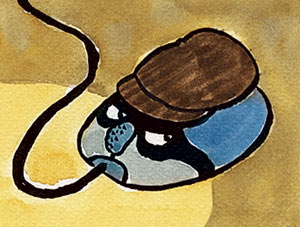Avisadores Vs Avisadores

Según el último anuario de The Economist, el 2005 la inversión publicitaria global en internet apenas llegó a un 5%. Sin embargo, esta cifra esconde el nivel de crecimiento de este segmento que tiene de cabeza a las agencias y a muchos centros de investigación para saber si el actual crecimiento se mantendrá y cuáles serán las consecuencias a la hora de alcanzar las cifras que hoy muestra la inversión en el offline. Este artículo se suma a las especulaciones, pero entrega antecedentes que pueden dar una idea de lo que viene. En Chile muchos ejecutivos de agencias de publicidad creen que el "punto de venta" jamás será superado por la web. En muchos casos, los agoreros de internet terminaron rendidos frente a las evidencias. La pregunta es qué pasará con el negocio informativo en el momento que los web periodísticos tenga los recursos para reclutar a los mejores periodistas.
WHAT makes Google so valuable? This week the search engine's share price rose above $500, valuing the company at more than $150 billion. Investors' optimism stems in large part from Google's dominance in the booming field of internet advertising, which is currently worth around $27 billion a year and is expected to grow to $61 billion by 2010. In the longer term the internet is expected to account for at least 20% of global advertising spending—around four times its share now. So there are years of growth still to come. But that rosy future could be in jeopardy unless the big internet companies, including Google, do more to clamp down on some dodgy practices on the web. Concern has been growing in recent months that “click fraud” might undermine the industry.
The problem is that many of the clicks on internet advertisements are bogus. The ability to aim such advertisements so that they pop up, for example, when a user searches for a particular word, is what makes them so valuable—and makes fraud so lucrative. American law firms, for instance, are prepared to pay as much as $30 each time someone clicks on an advertisement after searching for “mesothelioma”—the name of an obscure asbestos-related disease. It is, after all, quite an efficient way to find sufferers who might be interested in launching a money-spinning compensation lawsuit.
Sadly, cheating the system is easy. It is done in two main ways. The first exploits the fact that Google, Yahoo! and other firms place ads on the websites of their affiliates, who receive a small cut of the advertising revenue generated by each resulting click. Unscrupulous affiliates can generate a stream of bogus commissions by repeatedly clicking advertisements on their own websites (or getting other people or machines to do so on their behalf). The second form of click fraud is aimed at the competition: click on a rival company's advertisements, displayed on websites or alongside the results of an internet search, and its advertising budget will swiftly be exhausted.
Estimates of the extent of click fraud vary, but it is generally thought to account for around 10% of clicks on advertisements, though some estimates range as high as 50%. Disgruntled advertisers have launched class-action lawsuits against Google and Yahoo!, and big companies are threatening to hold back spending on internet advertising unless the industry generally becomes more transparent and accountable.
Been there, done that
To some extent, these are the ordinary growing pains of a new industry. A similar problem arose with television. After the first television advertisement was screened in 1941, advertisers wanted to know how many eyeballs they were getting for their money. Television companies were at first reluctant to tell them. However, during the 1950s and 1960s, proper rules, ratings and standards were gradually introduced.
Things are supposed to move more quickly on the internet. But the big internet firms seem to have been worryingly complacent. Small-business owners, to whom click-fraud is most apparent, grumble that Google and Yahoo! have tried to play down the scale of the problem. Eric Schmidt, the boss of Google, caused a storm earlier this year when he seemed to suggest at a conference that one solution to click fraud would be to “let it happen”, since advertisers would not be prepared to pay as much for bad clicks, so reducing commissions and hence the incentive for fraud. He also joked that Google's engineers were having “great fun” trying to keep ahead of the fraudsters. And Yahoo! concedes that click fraud has been a problem for years.
Stung by class-action suits, both Google and Yahoo! now insist they are taking the problem more seriously and have agreed to go along with an industry plan to draw up new standards and set up an independent auditing system to reassure advertisers by the middle of 2007 (see article). Both now provide refunds to advertisers who spot dodgy-looking referrals. Like recalcitrant teenagers, they are grudgingly giving in and doing the homework they should have done ages ago. But as well as shoring up the current system, internet firms must also devote more attention to developing new models that are less vulnerable to fraud, such as pay-per-action, in which advertisers pay up only if visitors referred to their websites actually buy something. Such new models will also require rules and standards to ensure that advertisers get what they pay for.
That will be difficult. But if the internet giants don't deliver what the advertisers want, advertisers will find other ways to market themselves. And if the advertisements evaporate, so will that remarkable $150 billion valuation.
Etiquetas: publicidad

0 Comentarios:
Publicar un comentario
Suscribirse a Comentarios de la entrada [Atom]
<< Página Principal